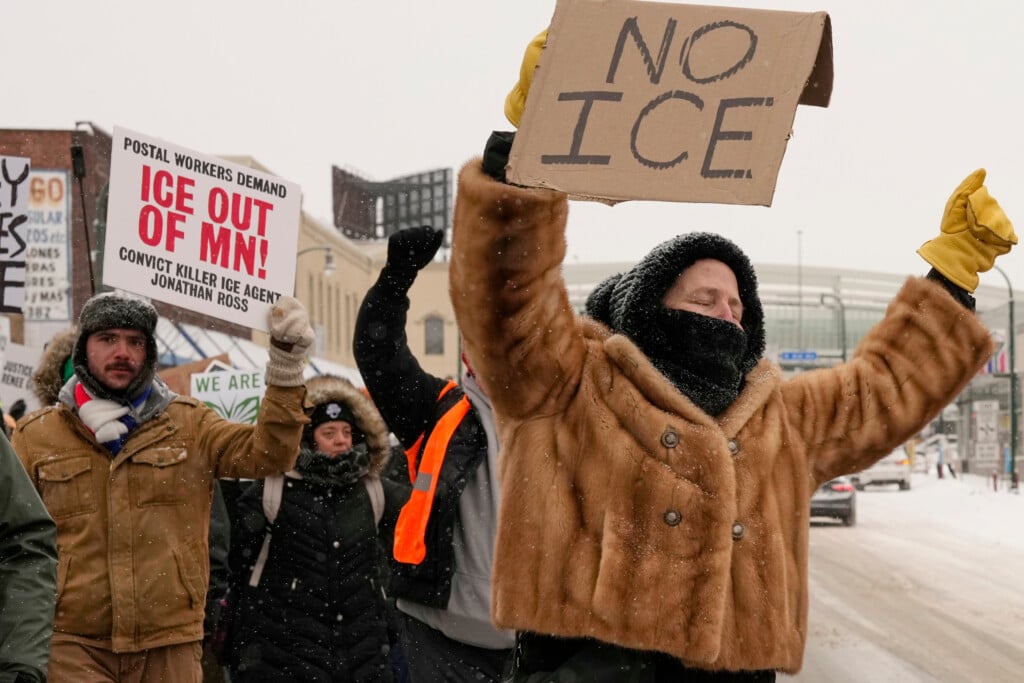Minnesota Legislature Takes Action On Felon Voting & Puts Sports Betting Back On The Agenda

ST. PAUL, Minn. (AP) —
The Minnesota Senate moved Tuesday to restore voting rights to convicted felons as soon as they get out of prison instead of continuing to require them to complete their parole before they can cast a ballot.
The Senate took up the “Restore the Vote” bill less than a week after the Minnesota Supreme Court upheld the state’s current restrictions and left it up to the Legislature to change them. Democrats behind the measure say it will help reintegrate former inmates — who are disproportionately people of color — back into society.
“We know that in the state of Minnesota right now we have more than 55,000 of our friends, our neighbors and family members who are not allowed to vote. They should have the right to vote,” Democratic Senate President Bobby Joe Champion, of Minneapolis, told his colleagues.
The debate was expected to go late into the night. But early votes on amendments and procedural challenges indicated that the Senate Democrats’ one-vote majority was likely to hold and that the bill, which passed the House three weeks ago, would make it to Democratic Gov. Tim Walz for his promised signature.
Supporters of the bill said it took on an even greater urgency after the Minnesota Supreme Court last week rejected a challenge by the American Civil Liberties Union, which had argued that the state’s restrictions were unconstitutional.
The high court’s ruling acknowledged that 1% of white people, 6% of Black people and 9% of Native American people in Minnesota could not vote in 2018 because they had been convicted of a felony but had not completed their parole. If the right to vote was restored upon release from incarceration, it said, those percentages would drop to 0.1%, 1.5% and 2%, respectively.
Twenty-one other states restore voting rights when people with felony convictions leave prison, according to the National Conference of State Legislatures, including Republican-controlled North Dakota, Indiana and Utah. Some California lawmakers are pushing to allow felons to vote even while they’re still in prison, regardless of their crimes, as Maine, Vermont and the District of Columbia already do.
Champion said residents who would regain the right to vote are often people whom the courts have deemed safe for release, and that they’re working, raising families and paying taxes. He noted that groups representing prosecutors, public defenders, probation officers and crime victims support the bill, as does the state Department of Corrections.
“When individuals are connected to their communities and participating in pro-social activities, recidivism goes down, and the decision to do something to reoffend goes down as well,” he said.
Attempts by Republicans to weaken the bill failed, including one amendment to exclude people convicted of violent crimes and another that would have kept the requirement to complete parole in place at least for those convicted of child rape.
GOP Sen. Warren Limmer, of Maple Grove, disputed Champion’s assertions that probationary periods often run as long as 20 years in Minnesota. He noted that the Minnesota Sentencing Guidelines Commission around three years ago capped parole for most offenses at five years, with exceptions remaining for first-degree murder and rape.
Limmer told reporters during a break in the debate that felons should not regain their civil rights — in this case the right to vote — until after they’ve completed their full sentence, both their incarceration and probation. He also accused Democrats of getting weaker and weaker on criminals at a time when crime is already high.
“There are some offenders that have committed heinous crimes against innocent citizens. I don’t think the Senate understands that,” Limmer said. “Because this bill treats it as a one-size-fits all — all criminals get the same treatment.”
Legalizing sports betting is back on the agenda of the Minnesota Legislature, and advocates expressed hope Tuesday that they’ll find the votes to get a plan through the state Senate, where the idea has died before.
The Democratic proposal, introduced Monday, would put the state’s Indigenous tribes in control of in-person betting at their casinos as well as remote wagering via mobile devices. Similar to a bill that passed the House last year, the state’s two horse tracks and other venues would be shut out of the action.
This year, a trade group for tribal casinos and six major-league sports teams have forged an alliance to support the bill. While it got some Republican support in the Democratic-controlled House last year, it stalled in the GOP-controlled Senate. While support and opposition don’t break cleanly along party lines, supporters hope the new Senate Democratic majority will make the difference.
“More than 30 states, including all of Minnesota’s neighbors, have legalized sports betting in some form or fashion,” the lead House author, Democratic Rep. Zack Stephenson, of Coon Rapids, said at a news conference. “Minnesotans deserve the same opportunities that our neighbors have.”
The proposal is not aimed at producing a financial windfall for the state. The state’s cut would be 10% of the net wagers online and on mobile devices. It would raise an estimated $10 million to $12 million for regulation and consumer protection, programs for problem gamblers and for youth sports with an emphasis on communities with high levels of juvenile crime.
Wagers placed in person at tribal casinos would not be subject to state tax. Tribes could partner with popular online sports betting platforms such as DraftKings and FanDuel to let people bet from home.
“We’re not doing this to raise revenue for the state of Minnesota, we’re doing this in order to transition from an … illicit market into a legitimate market and to put guardrails on the activity,” Stephenson said.
The proposal still has a long way to go before becoming law. It needs to clear several committees in both the House and Senate, and Stephenson said he doesn’t expect floor votes anytime soon.
Democratic Sen. Matt Klein, of Mendota Heights, expressed optimism while acknowledging that he needs 34 votes to pass the bill in the Senate, where Democrats hold just a one-seat majority.
“It’s early, the language has just gotten out there, I cannot say I have 34 votes right now today,” Klein said.
Stephenson said they chose to exclude the Canterbury Park and Running Aces horse racing tracks, and other potentially interested entities, because the tribal casinos have the most experience running gaming operations and they operate across the state. And he said there probably aren’t enough votes to pass it in the House unless it’s exclusive to the tribes.
Republicans Sen. Jeremy Miller, of Winona, has been touting an alternative approach that would let the two tracks offer sports betting, and allow pro sports teams to offer it at their stadiums and arenas. The state’s cut also would be 10%, but the proceeds would be distributed more widely. Money would also go to tax relief for charitable gambling operations that offer pull-tabs, and for attracting major sporting events to Minnesota.
Miller told reporters he thinks its great that two of the three major stakeholders — the tribes and the teams — are now allied but that he still thinks the tracks should be included. He said he doesn’t think there are enough votes to pass it in the Senate “without something for the tracks” and that it won’t get bipartisan support if they’re left out.
“I’m optimistic that we can still get it done this year,” Miller said.






